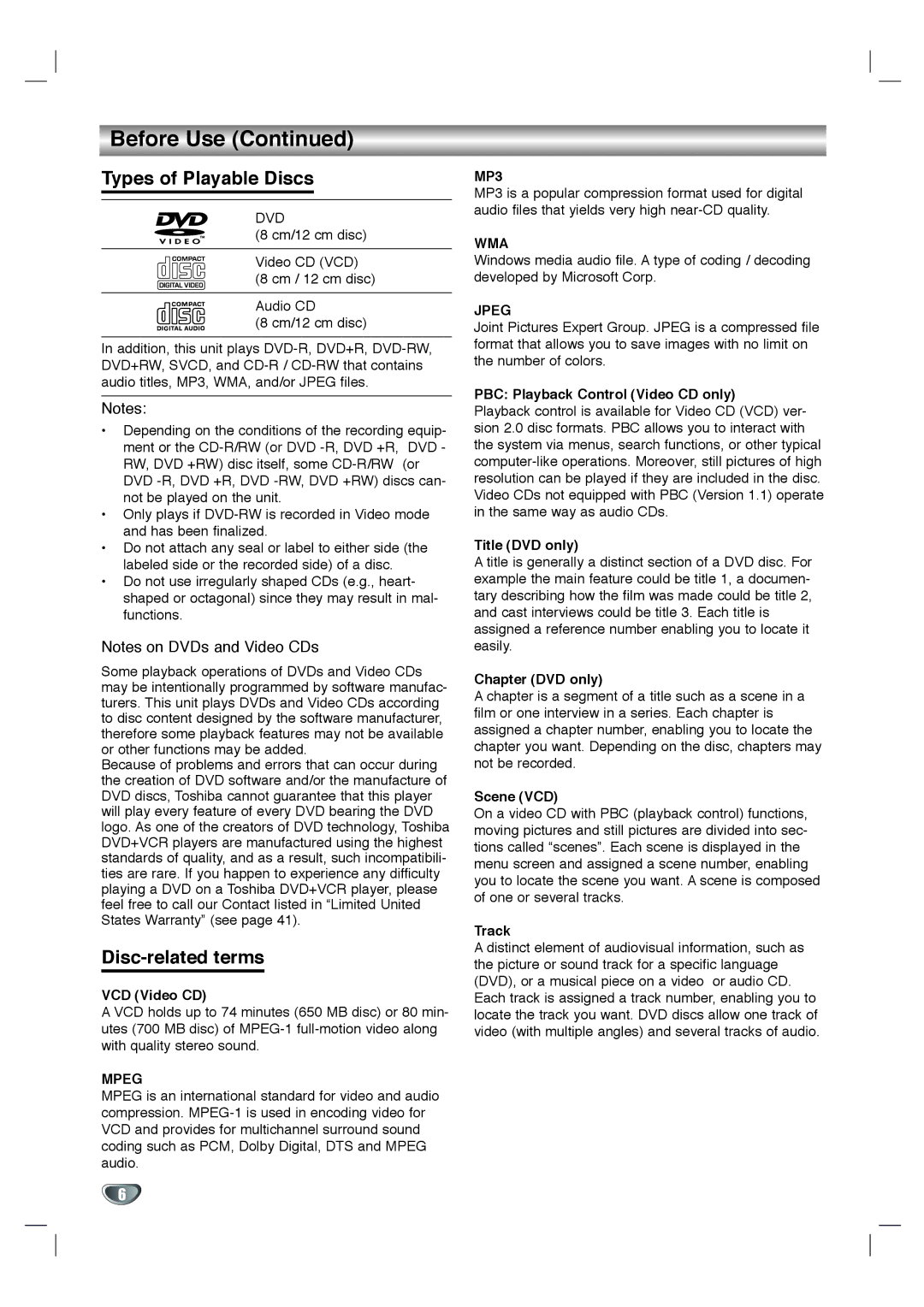
Before Use (Continued)
Types of Playable Discs
DVD
(8 cm/12 cm disc)
Video CD (VCD) (8 cm / 12 cm disc)
Audio CD
(8 cm/12 cm disc)
In addition, this unit plays
Notes:
•Depending on the conditions of the recording equip- ment or the
•Only plays if
•Do not attach any seal or label to either side (the labeled side or the recorded side) of a disc.
•Do not use irregularly shaped CDs (e.g., heart- shaped or octagonal) since they may result in mal- functions.
Notes on DVDs and Video CDs
Some playback operations of DVDs and Video CDs may be intentionally programmed by software manufac- turers. This unit plays DVDs and Video CDs according to disc content designed by the software manufacturer, therefore some playback features may not be available or other functions may be added.
Because of problems and errors that can occur during the creation of DVD software and/or the manufacture of DVD discs, Toshiba cannot guarantee that this player will play every feature of every DVD bearing the DVD logo. As one of the creators of DVD technology, Toshiba DVD+VCR players are manufactured using the highest standards of quality, and as a result, such incompatibili- ties are rare. If you happen to experience any difficulty playing a DVD on a Toshiba DVD+VCR player, please feel free to call our Contact listed in “Limited United States Warranty” (see page 41).
Disc-related terms
VCD (Video CD)
A VCD holds up to 74 minutes (650 MB disc) or 80 min- utes (700 MB disc) of
MPEG
MPEG is an international standard for video and audio compression.
MP3
MP3 is a popular compression format used for digital audio files that yields very high
WMA
Windows media audio file. A type of coding / decoding developed by Microsoft Corp.
JPEG
Joint Pictures Expert Group. JPEG is a compressed file format that allows you to save images with no limit on the number of colors.
PBC: Playback Control (Video CD only)
Playback control is available for Video CD (VCD) ver- sion 2.0 disc formats. PBC allows you to interact with the system via menus, search functions, or other typical
Title (DVD only)
A title is generally a distinct section of a DVD disc. For example the main feature could be title 1, a documen- tary describing how the film was made could be title 2, and cast interviews could be title 3. Each title is assigned a reference number enabling you to locate it easily.
Chapter (DVD only)
A chapter is a segment of a title such as a scene in a film or one interview in a series. Each chapter is assigned a chapter number, enabling you to locate the chapter you want. Depending on the disc, chapters may not be recorded.
Scene (VCD)
On a video CD with PBC (playback control) functions, moving pictures and still pictures are divided into sec- tions called “scenes”. Each scene is displayed in the menu screen and assigned a scene number, enabling you to locate the scene you want. A scene is composed of one or several tracks.
Track
A distinct element of audiovisual information, such as the picture or sound track for a specific language (DVD), or a musical piece on a video or audio CD. Each track is assigned a track number, enabling you to locate the track you want. DVD discs allow one track of video (with multiple angles) and several tracks of audio.
6
